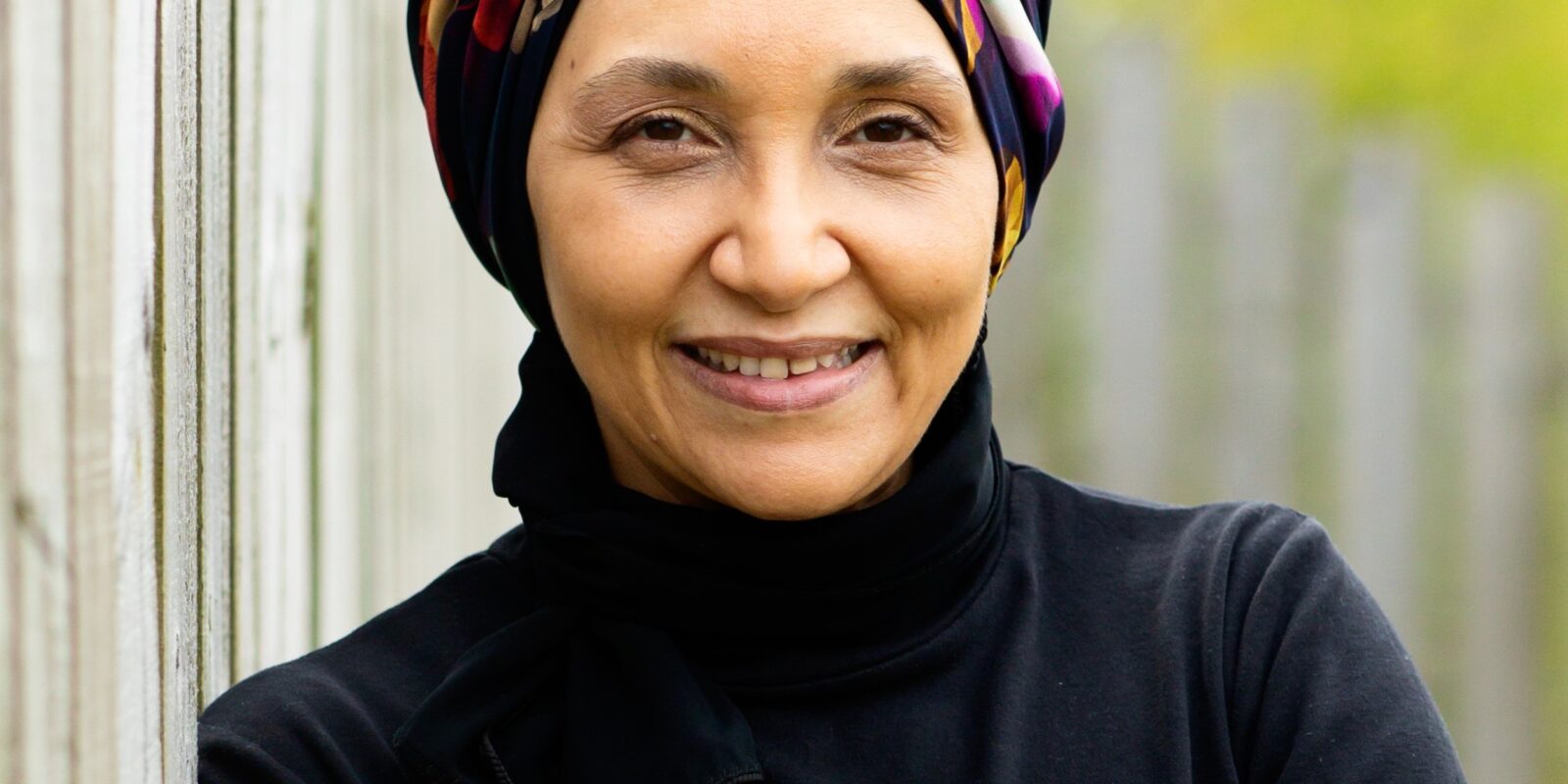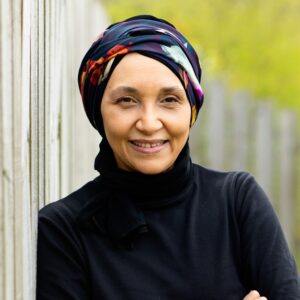Leila Aboulela
Biography
Leila Aboulela was born in 1964 in Cairo, to an Egyptian mother and a Sudanese father. She relocated to Sudan at the age of six weeks, spending her formative years in Khartoum until 1987. In 1990, Aboulela moved to Scotland with her husband and children. From 2000, Leila and her family moved frequently due to her husband’s work, and lived in Jakarta, Dubai, Abu Dhabi, and Doha, before finally moving back to Aberdeen in 2012. Aboulela is the author of six novels: The Translator (1999), Minaret (2005), Lyrics Alley (2010), The Kindness of Enemies (2015), Bird Summons (2018), River Spirit (2023), as well as two short story collections, Coloured Lights (2001) and Elsewhere, Home (2018). The Translator was nominated as one of the New York Times’ 100 Notable Books of the Year in 1999. The Kindness of Enemies was the Fiction Winner of the Scottish Book Awards. Aboulela’s short story ‘The Museum’, about the beginning of a faltering friendship between Shadia, a Muslim Sudanese student, and Bryan, a Scottish student at the University of Aberdeen, won the first Caine Prize for African Writing in 2000. The story anticipated the global turn towards decolonising the museum as an institution. Aboulela’s work has been translated into fifteen languages, and her plays, including The Sea Warrior, The Insider, and The Mystic Life, have been broadcast on BBC Radio. Aboulela was long-listed three times for the Orange Prize, now known as the Women’s Prize for Fiction. She is a Fellow of the Royal Society of Literature.
[Aboulela’s work] dwells on the synaptic spaces between languages, words, images, identities and cultures.
Writing
In Aboulela’s fiction, we witness how an engagement with colonial history can help to make sense of the present, particularly the often-fraught relationship between Islam and the West. River Spirit (2023) and The Kindness of Enemies (2015) are historical fictions that explore the evolution of the term jihad before and after colonization to illustrate the West’s changing perspectives on Islam, shaped by the specifics of conflicts in Sudan, Russia, and Afghanistan. The works consider the possibility of fostering meaningful dialogue between these two old adversaries through the experiences of Muslim women. Aboulela positions her female Muslim protagonists in Aberdeen, Khartoum, and London as they tell stories of love, migration, terrorism, jihad, loss, and war. Characters like Sammar in The Translator, Najwa in Minaret, or Salma in Bird Summons, struggle to develop a bond with their adopted homes due to the rise in Islamophobia in Britain. However, their eventual success in finding love and home through faith even while living in a secular environment, suggests the difficulty of sustaining a distinct secular-religious binary.
Aboulela’s fiction does not shy away from religious themes. The presence of Islam in her work lays down a challenge to postcolonial theorists who privilege categories of race, gender, class, and empire in their analyses of literary texts, and overlook the impact of religion in colonial history. The post-secular aesthetic of her work, and her engagement with various versions of history, especially in the representation of Muslim women, have made her writing both controversial and compelling. She is one of a number of modern writers for whom faith and fiction are intertwined, comparable in this sense to Catholic writers like Muriel Spark, Graham Greene, Evelyn Waugh, Anthony Burgess and Flannery O’Connor. Aboulela’s characters do not adhere to strictly orthodox interpretations of Islam, however. For Aboulela, sharia is “something personal […] something you would follow yourself. It does not need anyone else to implement it” (Aboulela 2009, 97). Faith is central to Najwa’s life and identity in Minaret, even if she does not always adhere to the tenets of her religion. During her difficult and occasionally traumatic sexual relationship with Anwar, it is faith that helps her: “I reached out for something new. I reached out for spiritual pleasures […]. Sometimes the tears ran down my face. I sweated and felt a burning along my skin, in my chest. This was the scrub I needed” (Aboulela, 2005, 243, 247). Islam does not give answers to all of Najwa’s questions, but it does provide her with a sense of solace and peace.
Aboulela also demonstrates through her work that Islam has been hijacked by corrupt postcolonial governments and extreme right-wing groups who have reduced its complexity to a reductive religious ideology. By contrast, a more nuanced understanding of Islam can ultimately lead to the demise of despotic rulers and egotistical Imams, as Sammar, the protagonist of The Translator, points out to Rae:
‘One hadith that says, “The best Jihad is when a person speaks the truth before a tyrant ruler.” It is not often quoted and we never did it at school. I would have remembered it.’
‘With the kind of dictatorship with which most Muslim countries are ruled’, he said, ‘it is unlikely that such a hadith would make its way into the school curriculum’
‘But we should know. . .’ (Aboulela, 1999, 105)
In her interview with Sadia Zulfiqar, Aboulela discusses in detail her creative process, what inspires her as a writer, and how the historic love-hate relationship between Islam and the West is portrayed in her work. Aboulela emphasises that ‘women’s interior lives matter, and they know that it matters. The text gives them the space to explore, to move at their own pace, to zigzag back and forth. It is not necessary to leave the world of Islam to achieve this—the tradition is rich, and the geography is limitless’. As the interview shows, Aboulela’s work also contributes in important ways to a better understanding of the Western gaze as it is cast onto North Africa, in particular, and to debates about how we might decolonise the curriculum. Informed by her early reading of Frantz Fanon and Edward Said, as well as the work of fellow Sudanese author Tayeb Salih, she has carved out a path distinguished by a subtle engagement with the daily lives of Muslim women, both at home and abroad, whom she portrays in all their richness and complexity.
—Sadia Zulfiqar, 2024
Cite this: Zulfiqar, Sadia. “Leila Aboulela .” Postcolonial Writers Make Worlds, 2024, https://writersmakeworlds.com/leila-aboulela. Accessed 20 May 2024.

